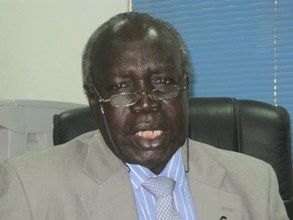South Sudan set to revive dilapidated agricultural research centers
By Julius N. Uma
September 26, 2010 (JUBA) — After over two decades of bloody civil war, that left Southern Sudan’s agricultural centers in tatters, the government has finally resolved to fully revitalize the sector, a senior official in the Agriculture and Forestry Minister has revealed.

The identified six ecological zones, he noted, were the green belt tropical, iron stone plateau, flat plains, Nile-Sobat corridor, the semi-arid areas and the hilly mountains, which are of the Mediterranean type.
“This region [of southern Sudan] had well established agricultural research centers even before the war, although they were all under the national government. But now, the southern government is determined to revive the sector with specific focus on research,” Lugor said.
It is estimated that over 80 percent of the southern population are currently engaged in agricultural practices, considered the backbone of rural economies. However, each household, according to recent survey, reportedly produces only 1.5 metric of food mainly for subsistence purposes.
“We need to reverse these trends and instead encourage agricultural productivity with a shift from subsistence to commercial production,” he said, adding that, “Farmers engaged in agriculture should be able to realize some capital from their harvests.”
Last year alone, Lugor said, the government imported 100 tractors which were given to various farmers’ associations as well as individuals actively involved in agricultural work.
The Agriculture and Forestry Ministry, he disclosed, was working in close partnership with the Ministry of Cooperatives and Rural Transformation to enlighten farmers especially in rural settings on agricultural-related issues, through campaigns to create awareness.
“Our focus is on participatory research that will involve interactive discussions with the farmers themselves. In this way, it will help us understand what kind of crops best suits their interests and what control measures best suits given situations,” the Undersecretary said.
Already, he added, his Ministry has embarked on creating a database of seeds currently available in the region, while the researchers will reportedly put emphasis on crops that are adaptable to the climate in southern Sudan.
Lugor cited financial constraints, vastness of the semi-autonomous region and manpower shortages, as some of the major set-backs to the planned revival of the agricultural sector.
RAYS OF HOPE
The Government of Southern Sudan (GoSS) has entered into bilateral agreements with partners like Food and Agricultural Organization (FAO) and the World Bank, while there are ongoing collaborations with reputable agricultural entities like Uganda-based National Agricultural Research Organization (NARO), Kenya Agricultural Research Institute (KARI) and the Association for Strengthening Agricultural Research in Eastern and Central Africa (ASARECA).
The GoSS recently hired the expertise of Uganda’s reknown agricultural research scientist, Joseph Mukiibi, an experienced researcher who founded NARO.
Mukiibi’s major task, Sudan Tribune has learnt, will be to establish a strategic agricultural research plan for the Ministry of Agriculture, alongside a team of seven southern Sudanese scientists who were brought from Khartoum.
Mukiibi said he would “come up with an implimentable research strategy, like those operating in Kenya, Uganda and even Ethiopia, so that Southern Sudan can join the rest of the region in Agricultural production.”
The experienced Ugandan researcher advised the GoSS to focus on training its own people to avoid over-dependence on those hired from neighboring nations. Locally trained personnel, he emphasized, should be able to look for jobs locally, thus creating a viable government program, in terms of the research centers’ sustainability.
(ST).

Wensi
South Sudan set to revive dilapidated agricultural research centers
This is another way forward. But, NO GM SEEDS!!!!!!. Just let’s use our local natural seeds. NO IMPORTATION of seeds either, because foreign seeds mainly from western countries might be GM seeds.